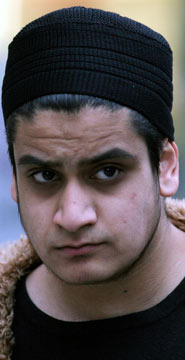Britain’s youngest terrorist, Hammaad Munshi, faces jail after guilty verdict – Times Online: “From Times Online
August 18, 2008

A 16-year old schoolboy faces a jail term after being convicted today as Britain’s youngest terrorist.
Hammaad Munshi, who was taking his GCSEs when he was arrested, was part of a cell of cyber-groomers which set out to brainwash the vulnerable to kill ‘non-believers’. He was convicted at Blackfriars Crown Court of making a record of material likely to be useful for terrorism over a guide to the manufacture of napalm.
For nearly a year the teenager, whose grandfather is a leading Islamic scholar, led a double life, the court heard. By day he attended lessons at the local comprehensive, and did as he was told. But in the evening, he spent hours surfing jihadist sites and distributing material to others as part of what the Crown branded a ‘worldwide conspiracy’ to ‘wipe out’ non-Muslims.
The court heard that that material contained included instructions about making napalm, other high explosives, detonators, and grenades, and ‘how to kill’.
Munshi was 15 when recruited by Aabid Khan, 23, a “key player” to help radicalise the impressionable and vulnerable in Britain and abroad with his message of “violent jihad”. They lived 10 miles apart, phoned each other during 2005 and 2006, and swapped documents about “black powder explosives”.
Khan wanted to fulfil the teenager’s wish to go abroad and “fight jihad”, and during one internet exchange discussed how the schoolboy might smuggle a sword through airport security.
The Dewsbury-born teenager was detained a day after Khan as he and friends returned from local Westborough High School. The IT whizz-kid – whose online Arabic profile “fidadee” means a “person ready to sacrifice themselves for a particular cause” – ran a website selling hunting knives and Islamic flags and was the cell’s computer specialist.
Two bags of ball-bearings – the shrapnel of choice for suicide bombers – were found in one of his pockets. On his PC were al-Qaeda propaganda videos and recordings promoting “murder and destruction”.
The teenager, whose grandfather is Sheikh Yakub Munshi, president of the Islamic Research Institute of Great Britain at the Markazi Mosque, Dewsbury, also stored notes on martyrdom under his bed.
“One who is not taking part in the battle nor has the sheer intention to die is in the branch of hypocrisy,” they read. “I don’t want to be a person like it has been mentioned about, I don’t want to be deprived of the huge amounts or lessons Allah has prepared for the believers in the hereafter.”
Khan, the schoolboy’s mentor, had links with proscribed terrorist organisations Jaish’e-Mohammed and Lashkar-e-Tayyaba, and helped radicalise jailed “wannabe suicide bomber” Mohammed Atif Siddique.
Khan was returning from Pakistan – possibly after terror camp training – when detained. The “routine stop” at Manchester Airport on June 6, 2006, yielded the largest cyber “encyclopaedia” of articles promoting terrorism seized by police. It included personal information, including addresses, of various members of the Royal Family, among the Queen, the Duke of Edinburgh, the Prince of Wales, the Duke of York, the Princess Royal, and the Earl and Countess of Wessex.
There was also a guide to killing non-Muslims, and discussions about setting up a secret Islamic state in a remote area of Scotland.
Also found were US and Canadian military training manuals, a Terrorist’s Handbook, a Mujahideen Explosives Handbook, and a Mujahideen Poisons Handbook containing a recipe for ricin and encouragement for “brothers” to experiment on “kuffar” (non-believers). Sketches of combat suits, which he dismissed as “ghetto clothing but with an Islamic theme”, were in his Filofax.
Bradford-born Khan – “Del Boy” to his contacts – ran At-Tibiyan Publications, an “online extremist support network”. In one exchange, he spoke of finding a “big target and taking it out… like a military base in the UK’.
Operation Praline, headed by Leeds Counter-Terrorism Unit, examined a huge number of files from hard-drives and DVDs in Khan’s suitcase, and identified two fellow “jihadists”.
Sultan Muhammad, 23, a post office night sorter, was Khan’s cousin and “right-hand man”.
They regularly chatted about killing non-believers and buying the explosives component acetone. He fled to London after Khan’s arrest and was arrested two weeks later near a “safe house.
Khan, who admitted being interested in jihad at 12, insisted he was in Pakistan selling mobiles and visiting earthquake victims and claimed the material police found resulted from “hoarding and curiosity”. Munshi did not give evidence, but used his barrister to also argue “curiosity”.
Muhammad remained in the dock as well, suggesting through counsel that the computer files belonged to others.
But the seven-woman, four-man man jury which spent six days considering the evidence, convicted them of eight offences under the Terrorism Act committed between November 23, 2005, and June 20, 2006.
A fourth defendant, Ahmed Sulieman, 30, from south London, was cleared of three charges of possessing terrorist materials after explaining the files found belonged to somebody else.
Khan and Muhammad will be sentenced tomorrow. Munshi will be dealt with at the Old Bailey on September 18 after the preparation of a pre-sentence report, although he was warned today that he faced a custodial sentence.